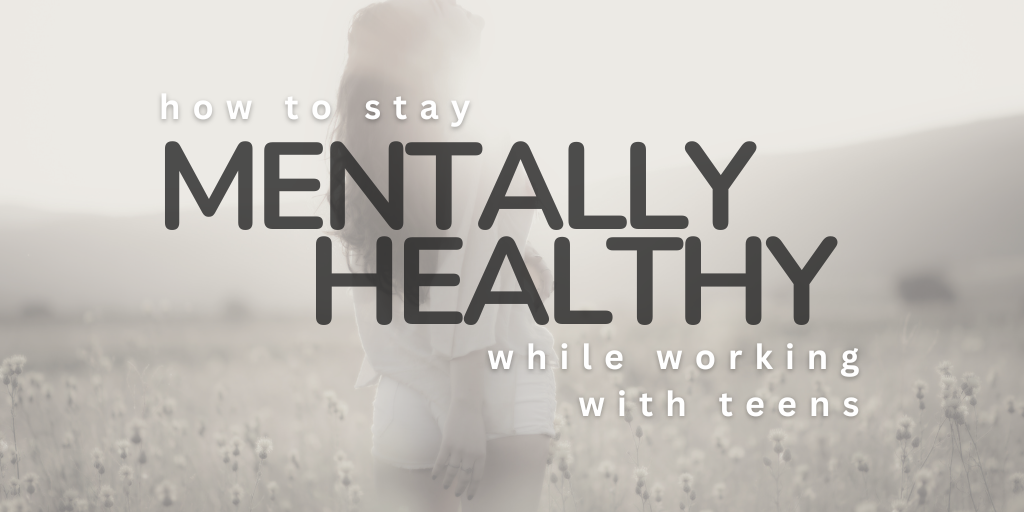How to protect your mental health as youth workers, mentors, parents, and teachers
Working with teens can be one of the most rewarding experiences — and also one of the most challenging.
To maintain good mental health while supporting teens, it’s important to prioritize self-care, establish healthy boundaries, and seek help when you need it. Creating a safe, supportive environment for teens to share their thoughts and feelings can make a huge difference. (Read: Clear boundaries are better for everyone!)
At the same time, keeping an eye on your own stress levels and making time to recharge through relaxing activities is key.
Here’s a closer look at how you can stay mentally healthy while working with teens:
1. Prioritize Self-Care
Set Boundaries:
It’s easy to blur the lines between your personal life and your work with teens, but setting clear boundaries is essential. Protect your downtime so you can return to your role with renewed energy and compassion. Remember: you can’t pour from an empty cup.
Practice Self-Compassion:
You’re only human. Acknowledge your own feelings, frustrations, and needs. Give yourself grace, and know it’s okay to ask for help. Taking care of your emotional health isn’t a luxury — it’s a necessity.
Engage in Activities You Enjoy:
Make space in your schedule for activities that bring you joy, whether it’s reading, hiking, painting, or playing music. These hobbies aren’t just fun; they’re powerful tools for managing stress and keeping your spirits high.
Seek Support:
Don’t underestimate the value of a good support system. Regular check-ins with friends, family, or a therapist can provide emotional release, new perspectives, and encouragement when challenges arise.
2. Foster a Supportive Environment for Teens
Create a Safe Space:
Teens are much more likely to open up when they feel safe and accepted. Strive to create an environment that is non-judgmental, welcoming, and affirming of their experiences.
Active Listening:
Really listen — not just to the words teens say, but to the feelings behind them. Make eye contact, nod, and reflect back what you’re hearing. Validating a teen’s experience builds trust and helps them feel truly heard.
Empathy and Understanding:
Step into their shoes. Teens face a unique set of challenges that may seem minor to adults but feel monumental to them. Showing empathy can deepen your connection and foster mutual respect.
Encourage Problem-Solving:
Rather than jumping in to fix every problem, support teens in finding their own solutions. This not only empowers them but also helps them build resilience and critical thinking skills.
3. Be Mindful of Your Own Well-Being
Recognize Stress:
Pay attention to warning signs like fatigue, irritability, or trouble concentrating. These can be signals that it’s time to slow down and prioritize your own mental health.
Manage Stress:
Incorporate relaxation techniques into your routine, like deep breathing exercises, meditation, or yoga. Even a few minutes a day can make a meaningful difference in calming your mind and re-centering your energy.
Seek Professional Help:
If you’re finding it hard to manage stress or emotional struggles on your own, reaching out to a therapist or counselor is a strong and healthy choice. Remember, caring for yourself allows you to care for others more effectively.
4. Encourage Healthy Habits in Teens
Promote Healthy Routines:
Help teens establish routines that prioritize sleep, nutrition, exercise, and downtime. Consistency in these areas can greatly impact their mood and ability to cope with challenges.
Model Positive Behaviors:
Your actions speak louder than words. When teens see you setting boundaries, practicing self-care, and seeking help when needed, they learn to do the same.
Educate on Mental Health:
Openly talk about mental health, why it matters, and how to spot the signs of a mental health challenge. The more we normalize these conversations, the more empowered teens will feel to seek help if they need it.
Protecting your mental health isn’t selfish; it’s smart.
By protecting your own mental health, you can create a more supportive and nurturing environment for the teens you work with. Taking care of yourself isn’t just good for you; it’s one of the best things you can do for the teens who look up to you.

Kelly Fann
Digital Media Manager
Kelly Fann | Digital Media Manager
Kelly has a desire to empower young people to grow into the best version of themselves. Using her background in branding and word-smithing, she is a master at highlighting resources that help teens learn skills that will enable them to grow and to adapt, to enjoy life and to be better citizens. Kelly has a MA in Linguistics from North Texas University.



